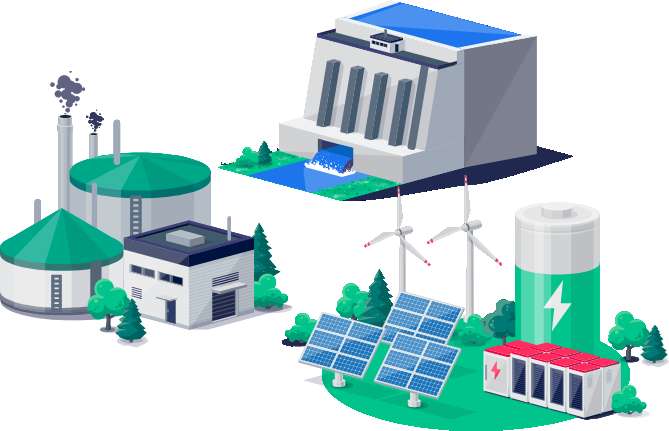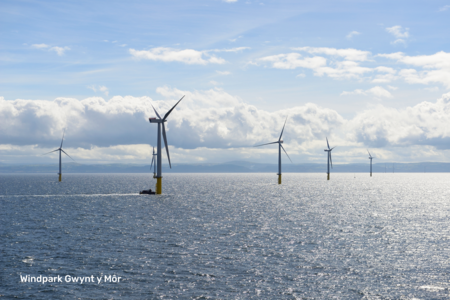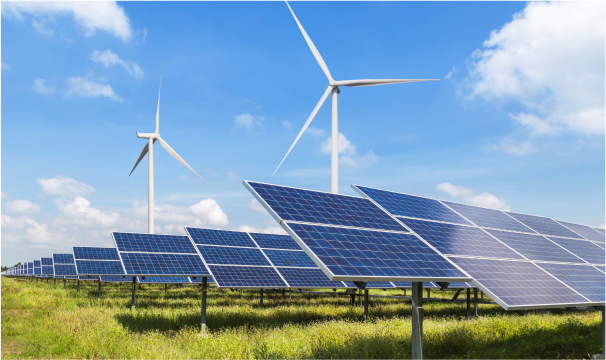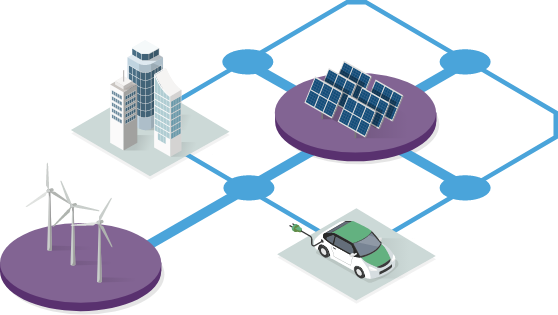Renewable energy for businesses
With net zero on the horizon, finding ways to reduce emissions is more important than ever, which is why many UK businesses are opting for carbon-free supply.
At npower Business Solutions, we offer renewable energy options to suit your business’s needs, including energy from wind, solar and hydro, as well as fully traceable renewable energy through our UK Corporate Power Purchase Agreement (CPPA).
Make the smart choice for your business and join the transition to a net zero future with our business renewable energy.

Switch to renewable energy, the smart way: with our UK CPPA
Corporate Power Purchase Agreements (CPPAs) are becoming an increasingly popular way for large businesses in the UK who don’t have generation assets of their own, to transition to pure renewable energy sources while reducing their carbon footprint.
CPPAs also provide a stable revenue stream for renewable energy generators, which can help to fund new renewable energy projects and promote the growth of the UK renewable energy industry.
Our UK CPPA offering allows businesses to secure a long-term supply of renewable energy from wind or solar by partnering directly with the UK’s second largest power producer and third largest renewable generator, RWE.

As the leading stakeholder in diverse assets, RWE hold the majority share of Gwynt y Mor windpark and bear the responsibility for driving successful commercialisation efforts.

You can find out more about RWE in the UK and Ireland
RWE supplies around 12% of UK electricity with a diverse operational portfolio of onshore wind, offshore wind, hydro, biomass and gas, amounting to over 9.3GW.
With 125 years of experience, RWE is also one of the most influential participants in the renewable energy sector and a pioneer in the development, construction, operation, and ownership of utility-scale renewable energy projects around the world. With their investment and growth strategy ‘Growing Green’, RWE is expanding green generation capacity and enabling more industrial and commercial customers to access high-quality green electricity direct from the generator.
UK CPPA benefits
- 100% renewable energy generated in the UK from wind or solar
- A named generation source to provide full supply traceability
- Option to secure all or a percentage of the total generation output per asset
- Longer-term CPPA contract, which can help to protect against market volatility
- Helps to support the growth and development of UK renewable energy generation
- Fully compliant with World Resources Institute (WRI) Greenhouse Gas (GHG) Protocol Scope 2 Guidance
- Report zero-carbon emissions without any requirement for additional evidence
- Renewable Energy Label to display on your site
- Supported by our Flex: Innovate contract to cover any additional supply and Renewable Energy Guarantees of Origin (REGO) certificates
Our UK CPPA is available for businesses with a suggested annual volume of circa 50 GWh+ and HH metering.
REGO Backed UK Renewable Energy
UK Business Renewable
Mixture of renewable generation
With our REGO Backed Renewable Energy, you can reduce your carbon footprint, meet your environmental goals, and report zero emissions in your Scope 2 reporting.
UK Renewable Pure
Wind, hydro and solar
Now available with renewable traceability reporting
If you’re looking for something more, our UK Renewable Pure is generated only from wind, hydro and solar.
UK Renewable Pure Plus
Wind, hydro and solar from a known source
Now available with renewable traceability reporting
Our UK Renewable Pure Plus provides additional assurance as your REGO certificates are sourced from our generation customers within the United Kingdom.
Our UK Pure Plus Generators
For every MWh of energy you use, we ensure that an equivalent amount of renewable energy is purchased from our customers who generate their own power through wind, solar, or hydro installations across the UK.As of August 2023, we have a portfolio of over 60 generation sites, producing circa 500 MW of renewable energy from wind, solar or hydro.


Renewable traceability reporting
Our partnership with Granular Energy means you can now access comprehensive carbon reporting for your business.
Gain total transparency to meet your business’ carbon reporting needs. Streamline your Scope 2 emissions reporting and become a renewable champion, with the evidence to back your progress up.
Trace the allocation of renewable energy that your business consumes with confidence, and report on your Scope 2 emissions with accuracy.
How do REGO certificates work?
Renewable Energy Guarantees of Origin (REGO) certificates provide evidence that a specific amount of electricity has been generated from renewable sources.We match the power your customer consumes by securing the corresponding number of REGO certificates, which are usually issued for each megawatt-hour (MWh) of renewable generation fed into the UK electricity system. UK Renewable Pure Plus REGOs are from renewable sources directly contracted with nBS and purchased along with the associated generation.
Benefits
- 100% renewable energy generated in the UK
- Fully compliant with WRI GHG Protocol Scope 2 Guidance
- EcoAct assurance stamp provides peace of mind that our products and processes are robust and compliant*
- Report zero-carbon emissions without any requirement for additional evidence
- Renewable Energy Label to display on your site
- Available with our fixed or flexible purchasing contracts (minimum volumes apply)
*UK Renewable Pure Plus and UK CPPA will be reviewed informally by EcoAct in late 2023 as part of our annual accreditation process and will be formally included in the 2024 audit.

EcoAct assurance
The EcoAct assurance stamp gives your customers confidence that their supply is robustly backed by a sufficient amount of REGOs (from UK generation only) and can therefore be reported as zero-carbon emissions power. EcoAct carries out annual audits of our UK renewable products.Renewable Energy Label
We will provide you with a Renewable Energy Label which you can display on your site to demonstrate your commitment to renewable energy.
Our UK renewable energy at a glance
| Name | UK Business Renewable | UK Renewable Pure | UK Renewable Pure Plus | UK CPPA |
|---|---|---|---|---|
| Description | UK renewable supply backed by REGOs from a 100% renewable source | UK renewable supply backed by REGOs from wind, hydro and solar only | UK renewable supply backed by REGOs from UK wind, hydro and solar sourced alongside the power | Fully traceable UK generated energy from wind or solar |
| Renewable energy generated in the UK | ✓ | ✓ | ✓ | ✓ |
| EcoAct assured | ✓ | ✓ | ✓ | Due for accreditation in 2025 |
| Fully compliant with WRI GHG Protocol Scope 2 Guidance | ✓ | ✓ | ✓ | ✓ |
| Energy Label to display onsite | ✓ | ✓ | ✓ | ✓ |
| Generation source | UK mix | UK wind, solar and hydro | UK wind, hydro, solar from a known source | UK wind or solar |
| Minimum contract length | 1 year | 1 year | 1 year | 7 years |
| Minimal annual volume | N/A | 10 GWh | 10 GWh | 50 GWh |
Find out how we can support your business’s sustainability targets with our UK renewable energy

